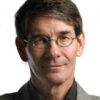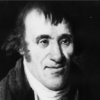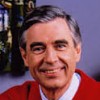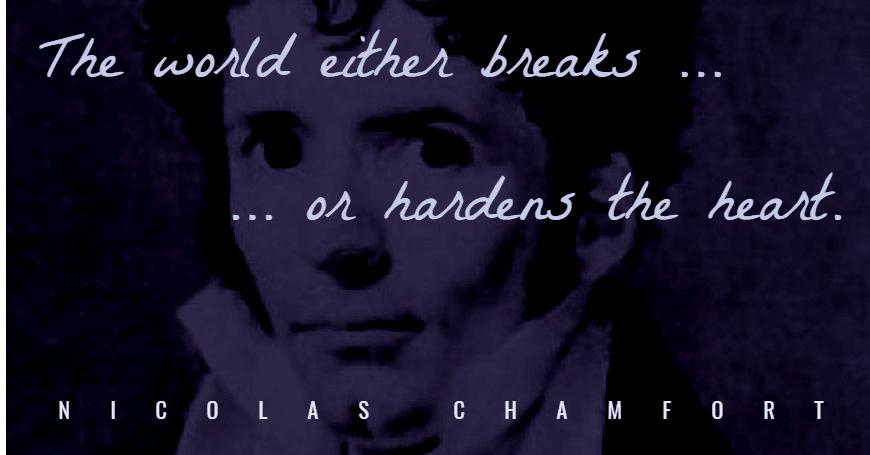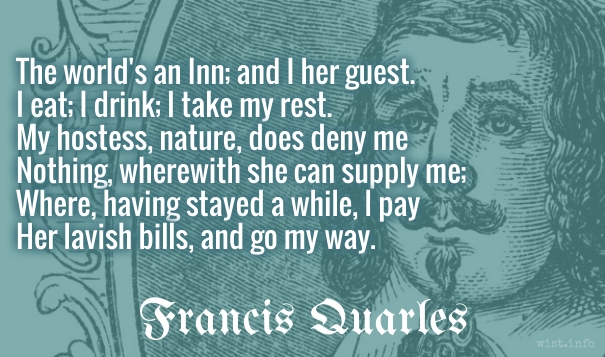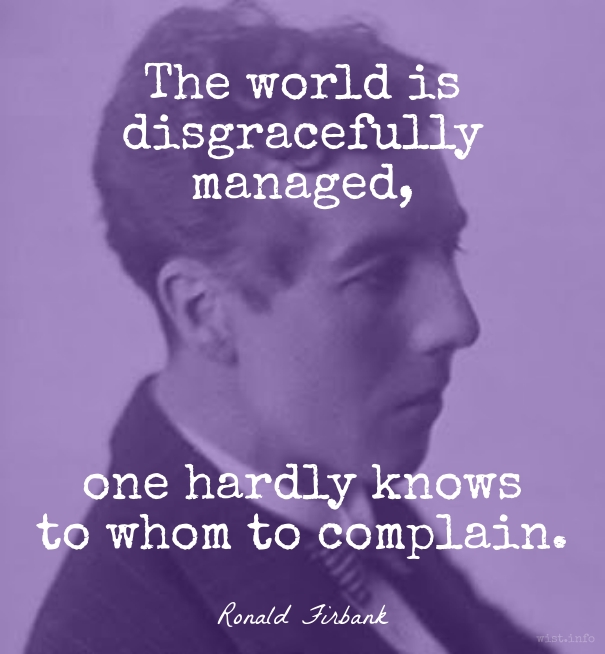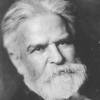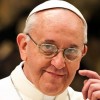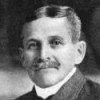The whole wide world is a cathedral;
I stand inside, the air is calm,
And from afar at times there reaches
My ear the echo of a psalm.[Как будто внутренность собора —
Простор земли, и чрез окно
Далекий отголосок хора
Мне слышать иногда дано.]Boris Pasternak (1890-1960) Russian poet, novelist, and literary translator
“When It Clears Up [Когда разгуляется],” st. 6, Poems (1958) [tr. Lydia Pasternak Slater (1959)]
(Source)
Quotations about:
world
Note not all quotations have been tagged, so Search may find additional quotes on this topic.
The old folk of our grandfathers’ young days sang a song bearing exactly the same burden; and the young folk of to-day will drone out precisely similar nonsense for the aggravation of the next generation. “Oh, give me back the good old days of fifty years ago,” has been the cry ever since Adam’s fifty-first birthday. Take up the literature of 1835, and you will find the poets and novelists asking for the same impossible gift as did the German Minnesingers long before them and the old Norse Saga writers long before that. And for the same thing sighed the early prophets and the philosophers of ancient Greece. From all accounts, the world has been getting worse and worse ever since it was created. All I can say is that it must have been a remarkably delightful place when it was first opened to the public, for it is very pleasant even now if you only keep as much as possible in the sunshine and take the rain good-temperedly.
Jerome K. Jerome (1859-1927) English writer, humorist [Jerome Klapka Jerome]
Idle Thoughts of an Idle Fellow, “On Memory” (1886)
(Source)
First published in Home Chimes (1885-09-26).
This basic clash of ideas and wills is but one of the forces reshaping our globe — swept as it is by the tides of hope and fear, by crises in the headlines today that become mere footnotes tomorrow. Both the successes and the setbacks of the past year remain on our agenda of unfinished business. For every apparent blessing contains the seeds of danger — every area of trouble gives out a ray of hope — and the one unchangeable certainty is that nothing is certain or unchangeable.
For in and out, above, about, below,
‘Tis nothing but a Magic Shadow-show,
Play’d in a Box whose Candle is the Sun,
Round which we Phantom Figures come and go.Omar Khayyám (1048-1123) Persian poet, mathematician, philosopher, astronomer [عمر خیام]
Rubáiyát [رباعیات], Bod. # 108 [tr. FitzGerald, 1st ed. (1859), # 46]
(Source)
The fanúsi khiyál, was an Indian magic lantern still used in Fitzgerald's day, "the cylindrical Interior being painted with various Figures, and so lightly poised and ventilated as to revolve round the candle lighted within."
Alternate translations:
Yon rolling heavens, at which we gaze bewildered,
Are but the image of a magic lanthorn;
The sun is the candle, the world the shade,
And we the images which flit therein.
[tr. Cowell (1858), # 28]
We are no other than a moving row
Of visionary Shapes that come and go
Round with this Sun-illumin'd Lantern held
In Midnight by the Master of the Show.
[tr. FitzGerald, 2nd Ed (1868), # 73]
We are no other than a moving row
Of Magic Shadow-shapes that come and go
Round with the Sun-illumin'd Lantern held
In Midnight by the Master of the Show.
[tr. FitzGerald, 3rd ed. (1872), # 68; and subsequent eds.]
This vault of heaven under which we move in a vain shadow, may be likened unto a lantern; the sun is the focus, and we, like the figures, live there in amazement.
[tr. McCarthy (1879), # 230]
These circling heavens, which make us so dismayed,
I liken to a lamp's revolving shade,
The sun the candlestick, the earth the shade,
And men the trembling forms thereon portrayed.
[tr. Whinfield (1882), # 165]
This wheel of heaven, which makes us all afraid,
I liken to a lamp's revolving shade,
The sun the candlestick, the earth the shade,
And men the trembling forms thereon portrayed.
[tr. Whinfield (1883), # 310]
A Turning Magic Lantern show this World,
Around the Sun as Candle swiftly whirled,
While mortals are but Phantom Figures traced
Upon the Shade, forever Onward hurled.
[tr. Garner (1887), 9.4]
This vault of Heaven at which we gaze astounded,
May by a painted lantern be expounded:
The light's the Sun, the lantern is the World,
And We the figures whirling dazed around it!
[tr. M. K. (1888)]
This vault of heaven, beneath which we stand bewildered,
we know to be a sort of magic. lantern:
know thou that the sun is the lamp flame and the universe is the lamp,
we are like figures that revolve in it.
[tr. Heron-Allen (1898), # 108]
This heavenly dome, where we distracted dwell,
Is likest to a magic lantern made;
The sun the candle and the world the screen,
And we the images that flit and fade.
[tr. Cadell (1899), # 125]
Passionate particles of dust and sun,
Run your brief race, nor ask why it is run --
We are but shadow-pictures, voices, dreams;
Perchance they make and break us -- just for fun.
[tr. Le Gallienne (1902)]
This wheel of Heaven which we amazed discern.
Is like a Chinese lantern, as we learn;
The Sun the lamp, the World the lantern is.
And we like figures are that on it turn.
[tr. Thompson (1906), # 353]
This vault of Heaven, 'neath which like fools we sit,
Is but a magic-lantern, dimly lit:
The sun the flame, the Universe the lamp,
We are the figures that revolve in it.
[tr. Talbot (1908), # 108]
This revolving sphere in which we stand bewildered
Is like unto a Chinese lantern,
The sun, its lamp and its shade the world,
We, the figures moving within it.
[tr. Rosen (1928), # 207]
Methinks this Wheel at which we gape and stare,
Is Chinese lantern -- like we buy at fair;
The lamp is Sun, and paper-shade the world,
And we the pictures whirling unaware.
[tr. Tirtha (1941), # 2.5]
This vault underneath which we lie bemused
Is, so to speak, God's magic shadow show
With sun for lamp, the world as a wide screen
For countless lie-rehearsing silhouettes.
[tr. Graves & Ali-Shah (1967)]
This Universal wheel, this merry-go-round
In our imagination we have found
The sun a flame, in the Cosmic lantern bound
We are mere ghosts, revolving, the flame surround.
[tr. Shahriari (1998), literal]
In our imagination, the Cosmic Wheel
Will cause us pain and cause us heal,
We find our source give life and steal,
We are phantoms that think and feel.
[tr. Shahriari (1998), figurative]
Childhood is the world of miracle and wonder; as if creation rose, bathed in light out of the darkness, utterly new and fresh and astonishing. The end of childhood is when things cease to astonish us. When the world seems familiar, when one has got used to existence, one has become adult. The brave new world, the wonderland has grown trite and commonplace.
[L’enfance c’est le monde du miracle ou du merveilleux: c’est comme si la creation surgissait, lumineuse, de la nuit, toute neuve et toute fraîche, et tout étonnante. Il n’y a plus d’enfance à partir du moment où les choses ne sont plus étonnantes. Lorsque le monde vous semble «déja vu», lorsqu’on s’est habitué à l’existence, on devient adulte. Le monde de la féerie, la merveille neuve se fait banalité, cliché.]Eugène Ionesco (1912-1994) Romanian-French dramatist
Fragments of a Journal [Journal en Miettes], “The Crisis of Language” (1967) [tr. Stewart (1968)]
(Source)
The world is a library of strange and wonderful books, and sometimes we just need to go prowling through the stacks.
Michael Dirda (b. 1948) American book critic
Book by Book: Notes on Reading and Life, ch. 8 (2005)
(Source)
Still, what I want in my life
is to be willing
to be dazzled —
to cast aside the weight of facts
and maybe even
to float a little
above this difficult world.
LEAR: When we are born, we cry that we are come
To this great stage of fools.William Shakespeare (1564-1616) English dramatist and poet
King Lear, Act 4, sc. 6, l. 200ff (4.6.200-201) (1606)
(Source)
That the world can be improved and yet must be celebrated as it is are contradictions. The beginning of maturity may be the recognition that both are true.
William M. Stott (b. 1940) American diplomat, academic in American Studies and English, author
Documentary Expression and Thirties America, ch. 15 (1973)
(Source)
Closing words of the book.
I have heard people say we should be strong so that if there is another war we can win it, then show the world the right way to live afterward. This is old stuff, and it is poppycock. Our behavior hardly qualifies us as world leaders. Ours is one of the most conservative governments in the world today, and one of the most bumbling. We have more provincialism and bigotry and superstition and prejudice per square mile than almost any other nation. We like to think of ourselves as a young, progressive country, but, while we do have energy, we have become smug and self-satisfied.
Sometimes it is good for us to have troubles and hardships, for they often call us back to our own hearts. Once there, we know ourselves to be strangers in this world, and we know that we may not believe in anything that it has to offer.
[Bonum nobis est, quod aliquando habeamus aliquas gravitates et contrarietates, quia sæpe hominem ad cor revocant, quatenus se in exilio esse cognoscat, nec spem suam in aliqua mundi re ponat.]
Thomas à Kempis (c. 1380-1471) German-Dutch priest, author
The Imitation of Christ [De Imitatione Christi], Book 1, ch. 12, v. 1 (1.12.1) (c. 1418-27) [tr. Creasy (1989)]
(Source)
See Psalm 119:71.
(Source (Latin)). Alternate translations:
It is good that we have sometime griefs and adversities, for they drive a man to behold himself, and to see that he is here but as in an exile, and be learned thereby to know that he ought not to put his trust in any worldly thing.
[tr. Whitford/Raynal (1530/1871)]
It is good that we sometimes have griefs and adversities, for they drive a man to behold himself and to see that he is but here as in exile, and to learn thereby that he ought not put his trust in any worldly thing.
[tr. Whitford/Gardiner (1530/1955)]
It is good for us sometimes to suffer affliction and contradiction, because they oftentimes call a man home unto himselfe. They make a man to know that he liveth here but in banishment, and that he must not trust to any thing in this world.
[tr. Page (1639), x.12.1-2]
It is good for me that I have been in Trouble, says David. Nor is it David's Case alone, for many Men have reason to bless that Providence which sends Crosses and Calamities upon them. These bring Man's Thoughts home, put him upon Reflection, and help him to understand himself and his Condition. They shew him, that he is in a State of Exile and Pilgrimage, and forbid him to set up his Hope and Rest, in a strange Country, where he is no better than a Sojourner.
[tr. Stanhope (1696; 1706 ed.)]
It is good for man to suffer the adversity of this earthly life; for it brings him back to the sacred retirement of the heart, where only he finds, that he is an exile from his native home, and ought not to place his trust in any worldly enjoyment.
[tr. Payne (1803)]
It is good that we have sometimes some troubles and crosses; for they often make a man enter into himself, and consider that he is here in banishment, and ought not to place his trust in any worldly thing.
[ed. Parker (1841)]
It is good for us that we sometimes suffer contrarieties and vexations; for they call a man back to the retirement of his heart, where only he finds, that, as he is an exile from his native home, he ought not to place his trust in any worldly enjoyment.
[tr. Dibdin (1851)]
It is good for us to have sometimes troubles and adversities, for they make a man enter into himself, that he may know that he is in exile, and may not place his hopes in anything of the world.
[ed. Bagster (1860)]
It is good for us that we sometimes have sorrows and adversities, for they often make a man lay to heart that he is only a stranger and sojourner, and may not put his trust in any worldly thing.
[tr. Benham (1874)]
It is good that we have sometimes troubles and crosses; for they often make a man enter into himself, and consider that he is here in banishment, and ought not to place his trust in any worldly thing.
[tr. Anon. (1901)]
It is good for us to have trials and troubles at times, for they often remind us that we are on probation and ought not to hope in any worldly thing.
[tr. Croft/Bolton (1940)]
It is good for us at times to have some burdens and adversities, for they often call a man back to his heart, that he may recognise himself to be in exile, and not fix his hope on anything earthly.
[tr. Daplyn (1952)]
It is good for us to encounter troubles and adversities from time to time, for trouble often compels a man to search his own heart. It reminds him that he is an exile here, and that he can put his trust in nothing in this world.
[tr. Sherley-Price (1952)]
It's good for you to go through difficult times now and again, and to have your will thwarted; the effect is often to make a man think -- make him realize that he is living in exile, and it is no use relying upon any earthly support.
[tr. Knox-Oakley (1959)]
It is a good thing that we have to face difficulties and opposition from time to time, because this brings us back to ourselves; it makes us realize that we are exiles and cannot pin our hopes on anything in this world.
[tr. Knott (1962)]
It is good for us now and then to experience difficulties and adversity; for they make man realize again that he is an exile and should not put his hopes on any worldly thing.
[tr. Rooney (1979)]
The world is not to be confined (as hitherto) within the straits of the intellect, but the intellect is to be enlarged to receive the image of the world, such as it is.
[Neque enim arctandus est mundus ad angustias intellectus (quod adhue factum est), sed expandendus intellectus et laxandus ad mundi imaginem recipiendam, qualis invenitur.]
Francis Bacon (1561-1626) English philosopher, scientist, author, statesman
Instauratio Magna [The Great Instauration], Part 3 “Parsceve ad Historiam Naturalem [Preparatory for Natural History],” “Aphorisms on the Composition of the Primary History,” # 4 (1622) [tr. Oxenford (1857)]
(Source)
(Source (Latin)). Alternate translations:
For the World ought not to be tyed into the straightness of the understanding (which hitherto hath been done) but our Intellect should be stretched and widened, so as to be capable of the Image of the World, such as we find it.
[Source (1670)]
For the world is not to be narrowed till it will go into the understanding (which has been done hitherto), but the understanding to be expanded and opened till it can take in the image of the world, as it is in fact.
[tr. Spedding/Ellis/Heath (c. 1900)]
The longer I live, the more I am inclined to the belief that this earth is used by other planets as a lunatic asylum.
George Bernard Shaw (1856-1950) British playwright and critic
(Attributed)
Attributed to Shaw by Judge Henry Neil in a letter (6 Sep 1919) to the Dublin Weekly Freeman. Neil said Shaw had made the statement in correspondence over pension laws for widows. While Voltaire (and others earlier) employed similar metaphors for Earth as a madhouse, this particular phrasing appears to be Shaw's.
More discussion of the quotation's origins here: This Earth Is Used By Other Planets as a Lunatic Asylum – Quote Investigator.
Few people can say of themselves that they are free of the belief that this world which they see around them is in reality the work of their own imagination. Are we pleased with it, proud of it, then?
Isak Dinesen (1885-1962) Danish writer [pseud. of Karen Christence, Countess Blixen]
“The Deluge at Norderney,” Seven Gothic Tales [Kasparson] (1934)
(Source)
To suppose that God Almighty has confined his goodness to this world, to the exclusion of all others, is much similar to the idle fancies of some individuals in this world, that they, and those of their communion or faith, are the favorites of heaven exclusively; but these are narrow and bigoted conceptions, which are degrading to a rational nature, and utterly unworthy of God, of whom we should form the most exalted ideas.
Ethan Allen (1738-1789) American businessman, land speculator, revolutionary, writer
Reason, the Only Oracle of Man, ch. 2 sec. 7 (1782)
(Source)
The world is not what anyone wished for, but it’s what everyone wished for.
James Richardson (b. 1950) American poet
“Vectors: 56 Aphorisms and Ten-second Essays,” Michigan Quarterly Review, #11 (Spring 1999)
(Source)
I know that the Bible is a special kind of book, but I find it as seductive as any other. If I am not careful, I can begin to mistake the words on the page for the realities they describe. I can begin to love the dried ink marks on the page more than I love the encounters that gave rise to them. If I am not careful, I can decide that I am really much happier reading my Bible than I am entering into what God is doing in my own time and place, since shutting the book to go outside will involve the very great risk of taking part in stories that are still taking shape. Neither I nor anyone else knows how these stories will turn out, since at this point they involve more blood than ink. The whole purpose of the Bible, it seems to me, is to convince people to set the written word down in order to become living words in the world for God’s sake. For me, this willing conversion of ink back to blood is the full substance of faith.
Barbara Brown Taylor (b. 1951) American minister, academic, author
Leaving Church: A Memoir of Faith, Part 1 (2006)
(Source)
No, your seriously steeped-in-madness dabbler in the esoteric sciences usually finds themself taxed with a rag-tag collection of hangers-on, typically consisting of minions, constructs, adventurers, and those unique, unclassifiable, individuals whose raison d’être appears to be to remind us of what a strange world it is.
For the world, I count it not an Inne, but an Hospitall, and a place, not to live, but to die in.
Thomas Browne (1605-1682) English physician and author
Religio Medici, Part 2, sec. 11 (1643)
(Source)
Here’s a comforting thought for you, Peter. However long you may live, the world will never lose its ability to surprise you with its beauty.
A lot of the arguments about religion going on at the moment spring from a rather inept understanding of religious truth. Our notion changed during the early modern period when we became convinced that the only path to any kind of truth was reason. That works beautifully for science but doesn’t work so well for the humanities. Religion is really an art form and a struggle to find value and meaning amid the ghastly tragedy of human life.
Karen Armstrong (b. 1944) British author, comparative religion scholar
“The Reason of Faith,” Interview with Michael Brunton, Ode (Sep-Oct 2009)
(Source)
Christ saw much in this world to weep over, and much to pray over: but he saw nothing in it to look upon with contempt.
ANGEL: Nothing in the world is the way it ought to be. It’s harsh, and cruel. But that’s why there’s us, champions. Doesn’t matter where we come from, what we’ve done or suffered, or even if we make a difference. We live as though the world is as it should be, to show it what it can be.
What makes earth feel like Hell is our expectation that it should feel like Heaven.
The world is not respectable; it is mortal, tormented, confused, deluded forever; but it is shot through with beauty, with love, with glints of courage and laughter; and in these, the spirit blooms timidly, and struggles to be a light amid the thorns.
George Santayana (1863-1952) Spanish-American poet and philosopher [Jorge Agustín Nicolás Ruíz de Santayana y Borrás]
Platonism and the Spiritual Life (1927)
(Source)
A person can go on living fairly well, seem to be a human being, be occupied with temporal matters, marry, have children, be honored and esteemed — and it may not be detected that in a deeper sense this person lacks a self. Such things do not create much of a stir in the world, for a self is the last thing the world cares about and the most dangerous thing of all for a person to show signs of having. The greatest hazard of all, losing one’s self, can occur very quietly in the world, as if it were nothing at all. No other loss can occur so quietly; any other loss — an arm, a leg, five dollars, a wife, etc. — is sure to be noticed.
Søren Kierkegaard (1813-1855) Danish philosopher, theologian
The Sickness unto Death, “The Forms of This Sickness, i.e., of Despair,” 1.a.1 (1849)
Alt. trans.:
- "A man may nevertheless be perfectly well able to live on, to be a mn, a it seems, to occupy himself with temporal things, get married, beget children, win honor and esteem -- and perhaps no one notices that in a deeper sense he lacks a self. About such a thing as that not much fuss made in the world for a self is the thing the world is least apt to inquire about, and the thing of all things the most dangerous for a man to let people notice that he has it. The greatest danger, that of losing one's own self, may pass off as quietly as if it were nothing; every other loss, that of an arm, a leg, five dollars, a wife, etc., is sure to be noticed." (Source)
- "But to become fantastic in this way, and therefore be in despair, although usually obvious, does not mean that a person may not continue living a fairly good life, to all appearances be someone, employed with temporal matters, get married, beget children, be honored and esteemed -- and one may fail to notice that in a deeper sense he lacks a self. Such things cause little stir in the world; for in the world a self is what one least asks after, and the thing it is the most dangerous of all to show signs of having. The biggest danger, that of losing oneself, can pass off in the world as quietly as if it were nothing; every other loss, an arm, a leg, five dollars, a wife, etc. is bound to be noticed." (Source)
Love would put a new face on this weary old world in which we dwell as pagans and enemies too long.
Ralph Waldo Emerson (1803-1882) American essayist, lecturer, poet
“Man the Reformer,” lecture, Boston (1841-01-25)
(Source)
I don’t think the boy of lively mind is hurt much by going to college. If he encounters mainly jackasses, then he learns the useful lesson that this is a jackass world.
H. L. Mencken (1880-1956) American writer and journalist [Henry Lewis Mencken]
“Editorial,” The American Mercury (April 1926)
(Source)
Reprinted in Prejudices: Sixth Series (1927).
Life is not made up of dramatic incidents — even the life of a nation. It is made up of slowly evolving events and processes, which newspapers, by a score of different forms of emphasis, can reasonably attempt to explore from day to day. But television news jerks from incident to incident. For the real world of patient and familiar arrangements, it substitutes an unreal world of constant activity, and the effect is already apparent in the way which the world behaves. It is almost impossible, these days, to consider any problem or any event except as a crisis; and, by this very way of looking at it, it in fact becomes a crisis.
A talent forms itself in solitude,
A character amid the stream of life.[Es bildet ein Talent sich in der Stille,
Sich ein Charakter in dem Strom der Welt.]Johann Wolfgang von Goethe (1749-1832) German poet, statesman, scientist
Torquato Tasso, Act 1, sc. 2, ll. 304-305 [Leonora] (1790) [tr. Ryder (1993)]
(Source)
(Source (German)). Alternate translations:
- "A talent doth in stillness form itself -- / A character on life's unquiet stream." [tr. Des Voeux (1827)]
- "Talents are nurtured best in solitude, -- / A character on life's tempestuous sea." [tr. Swanwick (1843)]
- "Man's talent ripens in tranquility, / His character in battling with the world." [tr. Cartwright (1861)]
- "A talent in tranquility is formed, / A character in the turbulence of affairs." [tr. Hamburger (20th C)]
- "Talent develops in quiet places, / Character in the full current of human life."
- Talents are best nurtured in solitude; / Character is best formed in the stormy billows of the world.
- "Genius is formed in quiet, / Character in the stream of human life."
The world is not always a kind place. That’s something all children learn for themselves, whether we want them to or not, but it’s something they really need our help to understand.
The world either breaks or hardens the heart.
[En vivant et en voyant les hommes, il faut que le cœur se briese ou se bronze.]
Nicolas Chamfort (1741-1794) French writer, epigrammist (b. Nicolas-Sébastien Roch)
Products of Perfected Civilization [Produits de la Civilisation Perfectionnée], Part 2 “Characters and Anecdotes [Caractères et Anecdotes],” ch. 3 (frag. 771) (1795) [tr. Finod (1880)]
(Source)
(Source (French))
Attributed by Chamfort as a statement in a philosophical debate, made by M. D---. Finod's translation is very much a paraphrase, as is:
Contact with the world either breaks or hardens the heart.
[ed. Ballou (1882)]
More literal translations:
Living among men and observing them, the heart must either break or turn to bronze.
[tr. Merwin (1969)]
In living and in seeing men, the heart must break or be bronzed.
[Source]
Though attributed by Chamfort to "M. D----," he also used the phrase himself, and it is usually attributed to him. Toward the end of his life, he wrote:
Je m'en vais enfin, de ce monde où il faut que le cœur se briese ou se bronze.
[I am leaving at last from this world where the heart must break or become bronze.]
It remains true, however, that an inconveniently placed railing or sharp corner will not remove itself from the path of a drunkard, even if that drunkard is unaware of the obstacles on the path he has set for himself; in other words, no matter to what degree we are oblivious to the world, it makes its own choices as to how oblivious it will be to us.
DRUMLIN: I know you must think this is all very unfair. Maybe that’s an understatement. What you don’t know is I agree. I wish the world was a place where fair was the bottom line, where the kind of idealism you showed at the hearing was rewarded, not taken advantage of. Unfortunately, we don’t live in that world.
ARROWAY: Funny, I’ve always believed that the world is what we make of it.
Carl Sagan (1934-1996) American scientist and writer
Contact, novel (1997) [film screenplay by J. Hart and M. Goldenberg]
(Source)
The world’s an Inn; and I her guest.
I eat; I drink; I take my rest.
My hostess, nature, does deny me
Nothing, wherewith she can supply me;
Where, having stayed a while, I pay
Her lavish bills, and go my way.
The world is disgracefully managed, one hardly knows to whom to complain.
“Do you think the world is growing worse?” Mr. Hennessy asked.
“I do not,” said Mr. Dooley.
“Do you think it’s growing better?”
“No,” said Mr. Dooley. “If it’s doing anything, it’s just turning around as usual.”
Do not imagine that the knowledge, which I so much recommend to you, is confined to books, pleasing, useful, and necessary as that knowledge is: but I comprehend in it the great knowledge of the world, still more necessary than that of books. In truth, they assist one another reciprocally; and no man will have either perfectly, who has not both. The knowledge of the world is only to be acquired in the world and not in a closet. Books alone will never teach it you; but they will suggest many things to your observation, which might, otherwise escape you; and your own observations upon mankind, when compared with those which you will find in books, will help you to fix the true point.
Lord Chesterfield (1694-1773) English statesman, wit [Philip Dormer Stanhope]
Letter to his son, #112 (4 Oct 1746)
(Source)
All things pass in time. We are far less significant than we imagine ourselves to be. All that we are, all that we have wrought, is but a shadow, no matter how durable it may seem. One day, when the last man has breathed his last breath, the sun will shine, the mountains will stand, the rain will fall, the streams will whisper — and they will not miss him.
I look forward to an America which commands respect throughout the world not only for its strength but for its civilization as well. And I look forward to a world which will be safe not only for democracy and diversity but also for personal distinction.
Let the great book of the world be your principal study.
Lord Chesterfield (1694-1773) English statesman, wit [Philip Dormer Stanhope]
Letter to his son, #249 (7 Apr 1751)
(Source)
Never give children a chance of imagining that anything exists in isolation. Make it plain from the very beginning that all living is relationship. Show them relationships in the woods, in the fields, in the ponds and streams, in the village and in the country around it. Rub it in.
An authentic faith — which is never comfortable or completely personal — always involves a deep desire to change the world, to transmit values, to leave this earth somehow better that we found it.
Francis I (b. 1936) Argentinian Catholic Pope (2013- ) [b. Jorge Mario Bergoglio]
Evangelii Gaudium, sec. 183 (24 Nov 2013)
(Source)
Don’t believe the world owes you a living. The world owes you nothing. It was here first.
Robert Jones Burdette (1844-1914) American humorist, lecturer, clergyman
“Advice to Young Men,” lecture (1833)
Quoted in the Duluth Evening Observer (1 Feb 1883). Frequently misattributed to Mark Twain. See here for more information.
We hope that the world will not narrow into a neighborhood before it has broadened into a brotherhood.
Lyndon B. Johnson (1908-1973) American politician, educator, US President (1963-69)
Speech (1963-12-17), Pageant of Peace Ceremonies, Washington, D.C.
(Source)
Johnson used this phrase many times in the early '60s to refer to how, as the world "shrank" through advances in travel (including for weapons), it had not resolved the ongoing problems within humanity, only brought them closer. Other examples:
We live in a world which has narrowed into a neighborhood before it broadened into a brotherhood.
[Reported (1961-08-01)]
The world has narrowed to a neighborhood before it has broadened to brotherhood.
[Speech, New York City (1963-12-17)]
See also King (1954).






